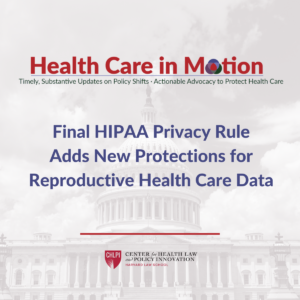Originally written by Ian Lopez and published by Bloomberg Law on 08/17/2023
Major drugmakers have tailored a legal crusade against the Biden administration’s drug price negotiation program that legal scholars say appears strategically designed to reach the US Supreme Court.
Merck & Co., Bristol-Myers Squibb, Astellas Pharma, and Johnson & Johnson are among those engaging in the sweeping legal challenge. They’re joined by the US Chamber of Commerce and the Pharmaceutical Research and Manufacturers of America in filing separate lawsuits against the Biden administration’s Health and Human Services Department, alleging the Medicare drug-pricing negotiation program designed to lower costs for millions of beneficiaries and reduce the government’s spending on expensive drugs is unconstitutional.
Filed across several different federal courts, the lawsuits aim to block the historic drug negotiation process from taking effect. They press a handful of constitutional claims, including those based on the First and Fifth amendments.
Attorneys say the drugmakers’ arguments rest on shaky grounds but the cases nevertheless may end up with the justices.
With Fifth Amendment claims in particular, the plaintiffs “are very strategically teeing this up” for the Supreme Court, said Laura Dolbow, a fellow at the University of Pennsylvania Law School who specializes in administrative law.
The Congressional Budget Office estimates Medicare’s drug-pricing program, which allows the government to haggle with manufacturers over a small set of high-priced products, will save the government almost $100 billion through 2031.
Medicare has until Sept. 1 to announce which 10 drugs will be the first subject to negotiations.
The drugmakers behind those products then have a month to determine whether they’ll participate in the process. Should a drugmaker decline to participate, it can either face an excise tax or pull the product in question—as well as all its other drugs—out of Medicare and Medicaid.
First Amendment
Drugmakers view the program as a threat to profits and research, and the first to sue over it was Merck.
In June, the drugmaker alleged the program violates the First Amendment by forcing manufacturers to endorse “HHS-dictated forced prices” and that the government was violating the Fifth Amendment by taking property for public use without offering just compensation. The US Chamber of Commerce then brought its own lawsuit, followed by PhRMA, Astellas, Bristol-Myers Squibb and Johnson & Johnson.
The pharmaceutical industry “has a heavy lift to overturn the legislation on constitutional grounds,” said Robin Feldman, a University of California College of Law, San Francisco, professor.
Feldman said the First Amendment claims are “particularly weak.”
“Is signing a contract a form of speech? It’s hard to imagine that the government will require companies to sign a paper saying ‘I declare this a fair price,’ ” Feldman said.
Zachary Baron, associate director of the Health Policy and the Law Initiative at Georgetown’s O’Neill Institute, said there’s been an “aggressive expansion” of First Amendment doctrine “that advances certain ideological and industry favorable goals.”
In June, the Supreme Court ruled a Christian website designer had a free speech right to create wedding pages for opposite-sex couples only. In 2022, the justices said a federal restriction on the repayment of candidate loans to their campaigns violated the Constitution’s free speech guarantee.
Medicare agency guidance released later in June, however, could weaken some of those speech concerns. In the 198-page guidance, the agency reversed course and said drugmakers could publicly discuss details from the negotiation process.
The drugmakers’ claims are still uphill climbs, Baron said. However, he noted judges in certain circuits have shown a willingness to entertain unusual legal theories. That, Baron said, includes the US Court of Appeals for the Fifth Circuit, where an appeal of PhRMA’s case would land because it was filed in the US District Court for the Western District of Texas.
Takings Clause
What bubbles out among the various plaintiffs’ Fifth Amendment claims is whether the HHS is violating the takings clause by taking the rights to a drugmaker’s patent-protected drugs, Feldman said. Success on these claims would be “like the shot heard around the world.”
“‘The reverence that the founders gave to property like land is worlds apart from what is reflected in the patent clause of the Constitution,” Feldman said.
Legal scholars note the Fifth Amendment arguments seem tailored to split the lower courts and push the Supreme Court to intervene.
The drug pricing program bars judicial review of the prices Medicare ultimately picks. That may be pushing the plaintiffs to sue now rather than wait and see Medicare’s price and bring a more routine Administrative Procedure Act suit, Dolbow said.
“How do you stop the train that’s already left the station? Can you stop it before it gets to the first station or the second station? That is the strategy drug companies need to implement if they want to keep this program from taking effect,” said Juliette Cubanski, deputy director of the Program on Medicare Policy at Kaiser Family Foundation.
The Problem of Precedent
Observers generally agree the drugmakers’ claims are a bit of a stretch and fly in the face of precedent.
The lawsuits at times portray “the idea of price regulations in the Medicare program as something that is novel,” said Abbe Gluck, professor of law and faculty director of the Solomon Center for Health Law and Policy at Yale Law School. She noted that doctors and hospitals have been subjected to price regulations “for decades.”
“The argument that the drug industry has the right to insist on participating in the Medicare program, without being subject to negotiation or government regulation of the pricing structure, would give the industry an advantage that other suppliers and providers do not have,” Gluck said.
“Far from their argument that this kind of regulation is unprecedented, it has long been part of the evolution of the structure of the Medicare program,” she said.
Legal scholars say that while precedent isn’t entirely in the drugmakers’ favor, they don’t rule out the potential for Supreme Court review because of the court’s conservative majority.
“As seen with Dobbs, the current configuration of this Supreme Court is really open to reconsidering precedent and taking different directions,” said Carmel Shachar, professor at Harvard Law School, referring to the 2022 decision that removed a federal right to abortion.
To contact the reporter on this story: Ian Lopez in Washington at ilopez@bloomberglaw.com
To contact the editors responsible for this story: Brent Bierman at bbierman@bloomberglaw.com; Catalina Camia at ccamia@bloombergindustry.com


Health Law & Policy, Commentary
Special Edition: Section 1557 ACA Non-Discrimination Rule Finalized: What the Rule Means for Health Care Access – Health Care in Motion
May 2, 2024